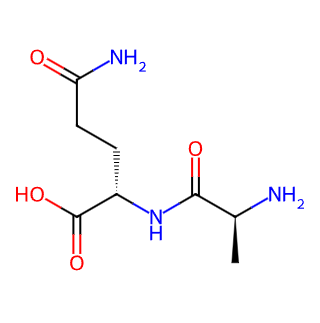- Synthetic anti-infective drugs
- Medications for the digestive system
- Antipyretic and analgesic drugs
- Medications for the blood system
- Medications for the respiratory system
- Anti-allergic drugs
- Medications for the urinary system
- Diagnostic medications
- Immunosuppressive and immunomodulatory drugs
- Vitamins and mineral supplements
- Antioxidants and medications for osteoporosis
- Antiparasitic drugs
- Ophthalmic medications
- Amino acids and their derivatives
- Dermatological medications
- Medications for the circulatory system
- Antitumor drugs
- Medications for the nervous system
- Hormonal and endocrine function-regulating drugs
- Antibiotics
- Others
CAS No.: 39537-23-0




L-Alanyl-L-Glutamine
Also known as L-Alanine-L-Glutamine or DIPEPTIVEN, L-Alanyl-L-Glutamine is a glutamine dipeptide with various biological activities and applications.
Basic Information
English Name: L-Alanyl-L-Glutamine
CAS Number: 39537-23-0
Molecular Formula: C8H15N3O4
Molecular Weight: 217.22
Physical and Chemical Properties
Density: Approximately 1.5 ± 0.1 g/cm³ (may vary slightly from different sources)
Boiling Point: 615°C
Melting Point: 215°C
Flash Point: >110°C
Solubility: Easily soluble in water, almost insoluble or insoluble in methanol, slightly soluble in glacial acetic acid
Biological Activities and Uses
Parenteral Nutrition: L-Alanyl-L-Glutamine is used for parenteral nutrition, providing glutamine to patients receiving parenteral nutrition and supplementing amino acid solutions. It helps prevent increased intestinal permeability and atrophy caused by long-term use of parenteral nutrition.
Promotion of Positive Nitrogen Balance and Muscle Protein Synthesis: L-Alanyl-L-Glutamine promotes positive nitrogen balance and regulates muscle protein synthesis, helping to maintain the body's protein balance.
Immune Function Enhancement: It enhances immune function and prevents the occurrence of bacteremia, which is particularly important for patients who need to strengthen their immune systems.
Antioxidant and Anti-inflammatory Effects: L-Alanyl-L-Glutamine benefits the antioxidant system, reduces inflammation, and may regulate the heat shock protein (HSP) response in catabolic conditions.
Application in Cell Culture: In cell culture, L-Alanyl-L-Glutamine is often used as a substitute for L-glutamine because it is stable in aqueous solutions and does not spontaneously degrade into ammonia and pyrrolidine carboxylic acid like L-glutamine.

Tai Yau Street, San Po Kong, Kowloon, Hong Kong, China.



